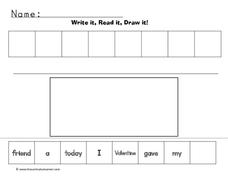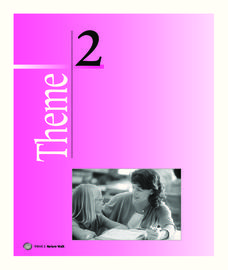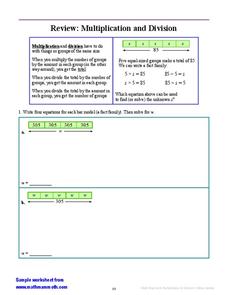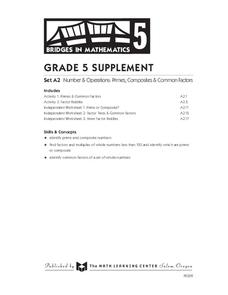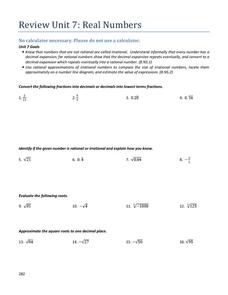Curriculum Corner
Write it, Read it, Draw it!
With nine pages of different sentences, you wont run out of practice writing, reading, and drawing. Learners read jumbled words, put the in the correct order to create a comprehesable sentence, and then write it, say it, and draw it.
Houghton Mifflin Harcourt
Finding Subjects and Predicates
Diagramming sentences has never been easier. Four worksheets feature exercises on simple subject and predicates, complete subjects and predicates, as well as compound verbs. Kids indicate the parts of the sentences with circles and...
Rosetta Stone
Absolute Possessive Pronouns
Pronouns are meant to replace nouns in a sentence, but don't replace this resource so easily! A collection of worksheets challenges young grammarians with fill-in-the-blanks, word searches, and sentence diagramming.
Houghton Mifflin Harcourt
Home Sweet Home: Extra Support Lessons (Theme 5)
Home Sweet Home is the theme of a unit comprised of extra support lessons. Scholars reinforce concepts through chants, grand discussions, and practice worksheets. Topics include digraphs, blending phoneme, long vowels, final sounds,...
EngageNY
Equivalent Ratios
Equivalent ratios show up on tape. Young mathematicians use tape diagrams to create equivalent ratios in the initial lesson on the topic. They learn the definition of equivalent ratios and use it to build others in the third segment of a...
Houghton Mifflin Harcourt
Nature Walk: Extra Support Lessons (Theme 2)
Reinforce concepts such as long vowels, spelling patterns, sound clusters, double-final consonants, and syllables with a nature-themed unit. Through a series of extra support lessons, learners compare and contrast using a...
EngageNY
Writing Addition and Subtraction Expressions
Symbols make everything so much more concise. Young mathematicians learn to write addition and subtraction expressions — including those involving variables — from verbal phrases. Bar models help them understand the concept.
EngageNY
The Relationship of Division and Subtraction
See how division and subtraction go hand-in-hand. The fourth installment of a 36-part module has scholars investigate the relationship between subtraction and division. They learn using tape diagrams to see that they can use repeated...
Curated OER
Green Zone Common Ground Conversation Starter Worksheets
Finding common ground and building conversation can often prove a difficult task for many. Help learners build this important social skill using this resource, which includes a Venn diagram activity and sentence prompts to help students...
Math Mammoth
Multiplication and Division
For this multiplication and division worksheet, learners review both methods and then match the equations to the multiplication or division diagrams and solve for y. Students then write four equations for the diagrams and solve for w....
Geometry Accelerated
Accelerated Geometry Review Sheet
Your geometry learners use their knowledge of various geometric concepts to write proofs. Starting with givens containing parallel line segments with transversals and triangles and quadrilaterals, and the mid-point and distance formulas;...
Common Sense Press
The Sign of the Beaver Vocabulary
A series of activities based on Elizabeth George Speare's The Sign of The Beaver takes your class through vocabulary, reading comprehension, and literary analysis. A good packet or collection of assignments for a reading circle.
Curriculum Corner
Coniferous and Deciduous Trees
What are the differences between coniferous and deciduous trees? Supplement your tree lessons with a set of activities that has learners describing, naming, comparing, and reading about deciduous and coniferous trees. The activities are...
Math Learning Center
Grade 5 Supplement Set A2 – Number and Operations: Primes, Composites and Common Factors
Incorporate riddles into your math lesson by having students make tree factors and determine if the number is a prime or composite. They will also use other clues to find the answer to the riddle while sharpening their...
Bethel School District
Observations and Inference
What's the difference between qualitative and quantitative observations? Learners make observations, inferences, and predictions about their environment with a set of questions and activities that are applicable to either language...
Rational Number Project
Initial Fraction Ideas Lesson 9 Overview
Visual models support young mathematicians with exploring equivalent fractions. Starting with a quick warm-up problem, children go on to work through a series of guiding practice problems before working with a partner identifying and...
Charleston School District
Review Unit 7: Real Numbers
Provide pupils with problems to check their understanding of the concepts within the unit. The seven-part series of lessons covers concepts related to irrational numbers. Learners convert between fractions and decimals, estimate the...
Noyce Foundation
Ducklings
The class gets their mean and median all in a row with an assessment task that uses a population of ducklings to work with data displays and measures of central tendency. Pupils create a frequency chart and calculate the mean and median....
EngageNY
Solving Area Problems Using Scale Drawings
Calculate the areas of scale drawings until a more efficient method emerges. Pupils find the relationship between the scale factor of a scale drawing and the scale of the areas. They determine the scale of the areas is the square of the...
Other popular searches
- Diagram Sentences Worksheets
- Blank Venn Diagram Sentences
- Diagram Sentences 7th Grade
- Diagram Sentences Venn
- Venn Diagram Sentences Venn
